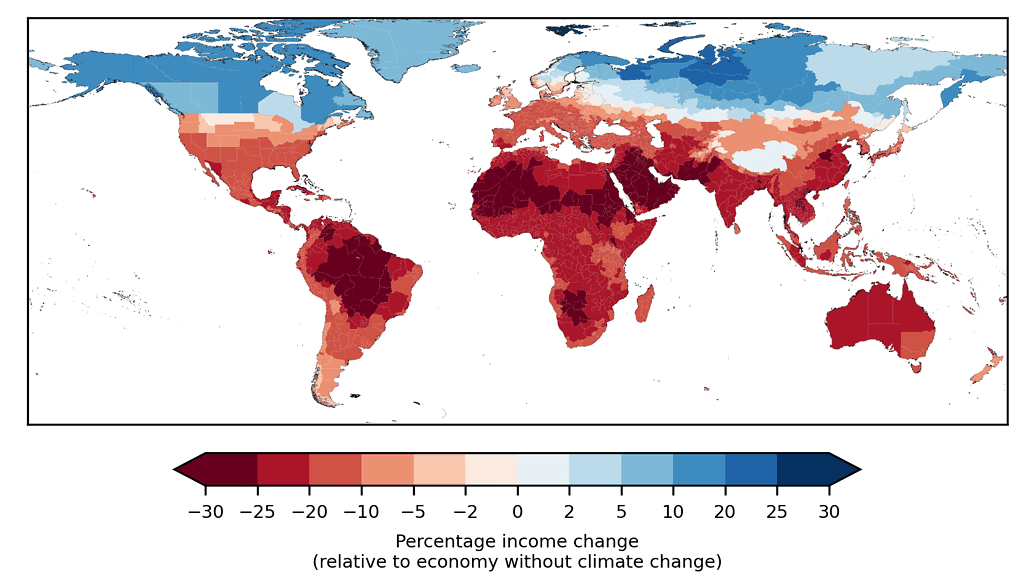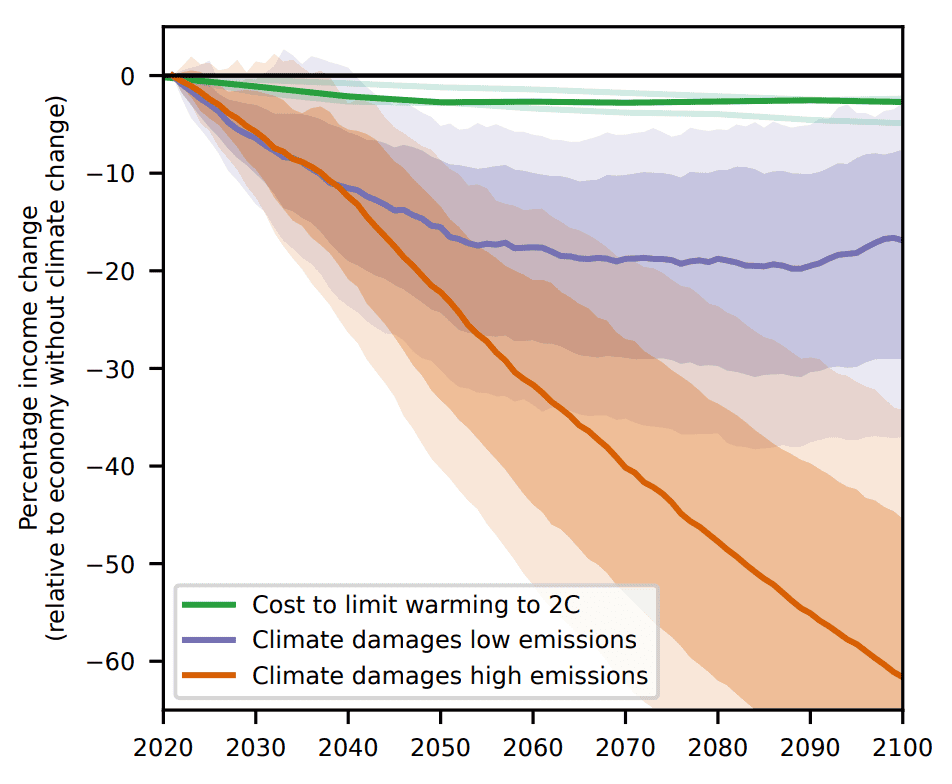
A new study has pointed out concerning new predictions about how the global economy will respond to climate change. The study shows that the global economy is expected to experience a significant 19% decrease in income over the next 26 years because of climate change, compared to a hypothetical scenario without climate change impacts.
The estimated economic damage, amounting to $38 trillion annually, could be up to six times greater than the costs of shifting away from fossil fuels and limiting warming as per the agreements of the Paris Climate Agreement. Paris Climate Agreement requirements.
Most importantly, this anticipated damage is unavoidable. Even if the world manages to restrict global warming to no more than 2°C, the global economy could suffer up to 20% average regional income loss. The average global temperatures have already risen by a bit more than half of the increase since 1975. In a situation where no action is taken to mitigate, the damage could surge to 60% income loss. 1° Celsius The economic impact of climate change
Almost all countries are expected to experience significant economic losses and forgone opportunities due to the impact of climate change. However, certain countries will face more severe impacts than others. The data reveals that countries with lower incomes and historically lower emissions are likely to suffer disproportionately. These countries are expected to endure income losses 61% higher than those in higher-income countries, and 40% greater than in higher-emission countries. This underscores a challenging reality where the nations least accountable for climate change might encounter the most severe economic downturns.
Leonie Wenz, the lead researcher from the Potsdam Institute for Climate Impact Research in Germany, emphasized the importance of understanding the impact of climate change on the economy. This understanding is crucial for governments, central banks, private businesses, households, etc., to plan and adapt in order to prevent at least some of these damages.
Leonie Wenz also highlighted the economic benefits of mitigating climate change, even from a purely economic perspective. While there has been significant focus on the cost of protecting the climate in public debates, the potentially high cost of inaction has received much less attention and discussion. ZME Science.
While researchers anticipated substantial economic damages from climate change, they were still surprised by the magnitude of the damages. Additionally, they did not expect the damages to be much higher than the cost required to limit global warming to 2°C. Furthermore, they were surprised to find damages in the majority of countries worldwide, including highly developed ones that currently have cooler climates, such as Germany or France. The dimension of injustice in these findings is also shocking.
In the latter half of the century, significant economic damages and costs for society can still be avoided if emissions are drastically and immediately reduced.
The cost of taking action versus doing nothing
Projected income changes in 2049 compared to a scenario without climate change. Credit: Maximilian Kotz.

weather events like heavy rainfall and intense heatwaves. The group of researchers used a practical method to evaluate the economic harm from over 1,600 areas globally in the last four decades. By examining local climate and income data along with advanced econometric models, the researchers were able to identify the economic impacts of climate variability on a much finer scale than in earlier studies.
The climate impact assessment was based on temperature and precipitation data for the previous 40 years. Based on how heatwaves and rainfall have affected the economy in the past, the researchers projected into the future considering current emission scenarios and projections from 21 climate models.
“These can affect the economy through various channels such as reduced labor productivity, lower agricultural yields or damaged infrastructure,” Wenz wrote in an email.
Projected change in global income relative to an economy without climate change for a high- and a low-emission scenario. Damages up until 2049 are indistinguishable across scenarios and outweigh the cost required to achieve the Paris climate agreement by six-fold. Credit: Maximilian Kotz.

Tropical countries, which are already warmer, will suffer the brunt of the damage. The U.S. has a projected median income reduction of 11%. Only Canada, Russia, Norway, Finland, and Sweden are projected to see an uptick due to new land and resources freed up by an ice-free Arctic. This highlights a disturbing disparity: the regions projected to suffer the most significant economic hits are those that have historically contributed the least to global emissions.
It could get even worse. The researchers did not account for quite a few factors known to be heavily impacted by climate change, such as
sea level rise or tropical storms. Previously, The Dragas Center that taking no action to mitigate harm from rising sea levels would result in a $79.1 billion decline in economic output by the end of the century. Tropical storms have caused a yearly average of calculated around $50 billion in losses over the last decade. These findings amplify the call for immediate and decisive policy action on climate change. If these findings serve as any indication, we are now in dire need of strategies that go beyond mere adaptation. We need to push for a holistic overhaul of how economies account for and address the burgeoning risks posed by climate change.
“While our study is more comprehensive than previous assessments, there are still a number of important impact channels missing that could further raise estimates of the economic damages from climate change. For example, we do not consider economic impacts from tropical storms, wildfires, or sea level rise (yet). Furthermore, by looking at changes in economic output, we are focusing on market impacts but climate change has of course various further impacts such as for example loss of life, cultural heritage, and nature,” Wenz said.
The findings appeared in the journal
Was this helpful? Nature.









